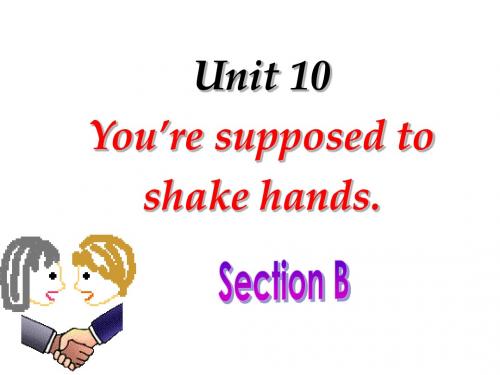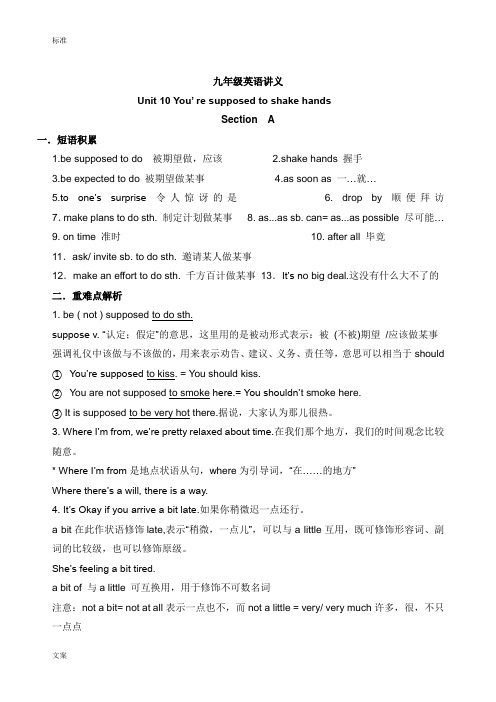Unit 10 You're supposed to shake hands人教版新目标英语九年级教学设计 初三教案
- 格式:doc
- 大小:121.00 KB
- 文档页数:22

人教版九年级英语《Unit 10 You’re supposed to shake hands. 》Section A_教学设计1一. 教材分析人教版九年级英语《Unit 10 You’re supposed to shake hands. 》Section A主要介绍了英语中不同场合下的礼貌用语和行为规范。
本节课主要围绕着日常交际用语展开,包括如何问候、介绍、道歉、道谢等。
教材通过丰富的情景对话和图片,帮助学生理解和掌握这些交际用语,提高他们的实际英语应用能力。
二. 学情分析九年级的学生已经具备了一定的英语基础,能够理解和运用一些基本的英语交际用语。
但是,他们在实际应用英语进行交际时,往往会因为害羞、自信心不足等原因而产生紧张和焦虑情绪,影响他们的交际能力。
因此,在教学过程中,需要注重培养学生的自信心,鼓励他们大胆开口说英语。
三. 教学目标1.知识目标:学生能够掌握本节课所学的日常交际用语,如问候、介绍、道歉、道谢等。
2.能力目标:学生能够在实际情景中运用所学的交际用语,提高他们的英语交际能力。
3.情感目标:通过本节课的学习,学生能够更加自信地使用英语进行交际,培养他们的跨文化交际意识。
四. 教学重难点1.重点:学生能够掌握并熟练运用日常交际用语。
2.难点:学生能够在实际情景中灵活运用所学的交际用语,并进行有效的交际。
五. 教学方法1.情境教学法:通过设置不同的情景,让学生在实际语境中学习和运用英语交际用语。
2.交际法:鼓励学生积极参与课堂交际活动,提高他们的英语交际能力。
3.任务型教学法:通过完成各种任务,让学生在实践中学习和运用所学的交际用语。
六. 教学准备1.教学课件:制作课件,包括文本、图片、音频等素材,以便于教学展示。
2.教学道具:准备一些日常交际用语相关的道具,如名片、礼物等,以便于课堂操练。
3.教学资源:收集一些关于日常交际用语的视频素材,用于课堂拓展。
七. 教学过程1.导入(5分钟)利用学生日常生活中的一些交际场景,如问候、介绍等,引导学生思考和讨论这些场景下应该如何用英语进行交际。

九年级英语上册Unit10 You’re supposed to shake hands一、课文知识要点:1、You’re supposed to shake hands.你应该握手.①be supposed to do sth.是“应该……",与should用法相似。
否定形式是be not supposed to do sth,意为“不应该……"。
You are supposed to study harder。
你应该更努力学习.You are not supposed to eat so much。
你不应该吃这么多。
Drivers are supposed to wear the seat belt when driving。
司机开车的时候应当系好安全带。
②shake “摇动、抖动”shake → shook → shakenshake hands 握手;shake hands with sb。
/ shake one’s hands 与某人握手At last,he shook his head and refused.最后,他摇摇头拒绝了.2、In the United States,they’re expected to shake hands。
在美国他们要握手.expect “期望;指望;认为;预料”;expect to do sth.期望/期待做某事expect sb to sth. 期待某人做某事be expected to sth 被期待/要求做某事She expects to go abroad。
她期待着出国。
I expected my son to pass the exam.期望我的儿子通过考试。
You can’t expect me to finish the work in just two days.你不能期望我仅在两天之内完成这项工作。
She is expected to be a good doctor。



九年级英语讲义Unit 10 You’ re supposed to shake handsSection A一.短语积累1.be supposed to do 被期望做,应该2.shake hands 握手3.be expected to do 被期望做某事4.as soon as 一…就…5.to one’s surprise 令人惊讶的是6. drop by 顺便拜访7.make plans to do sth. 制定计划做某事8. as...as sb. can= as...as possible 尽可能…9. on time 准时10. after all 毕竟11.ask/ invite sb. to do sth. 邀请某人做某事12.make an effort to do sth. 千方百计做某事13.It’s n o big deal.这没有什么大不了的二.重难点解析1. be ( not ) supposed to do sth.suppose v. “认定;假定”的意思,这里用的是被动形式表示:被(不被)期望/应该做某事强调礼仪中该做与不该做的,用来表示劝告、建议、义务、责任等,意思可以相当于should①You’re supposed to kiss. = You should kiss.②You are not supposed to smoke here.= You shouldn’t smoke here.③ It is supposed to be very hot there.据说,大家认为那儿很热。
3. Where I’m from, we’re pretty relaxed about time.在我们那个地方,我们的时间观念比较随意。
* Where I’m from是地点状语从句,where为引导词,“在……的地方”Where there’s a will, there is a way.4. It’s Okay if you arrive a bit late.如果你稍微迟一点还行。

Unit 10 You’re supposed to shake hands.The First PeriodSection A(1a-2d)Ⅰ.Teaching aims1.Knowledge aims:(1)Key words:custom,bow,kiss,greet(2)Key phrases:be supposed to do,shake hands,be expected to do,hold out,to one’s surprise,assoon as,on both sides of(3)Important sentences:①—What are you supposed to do when you meet someone for the first time?—You’re supposed to shake hands.②I held out my hand and to my surprise,she kissed me on both sides of my face.2.Ability aims:Learn to talk about good manners when we meet in different countries.3.Emotion aims:To be interested in different cultures.Ⅱ.Important points:Learn to express some sentences using“be supposed to do〞.Ⅲ.Difficult points:Grasp the usage of “be supposed to do〞.Ⅳ.Teaching processStep 1 Warming upShow students some pictures about “shake hands〞, “bow〞or “kiss〞.Answer some questions. T:In Brazil,what are you supposed to do when you meet someone for the first time?S:You’re supposed to shake hands.Teacher can ask five students about different countries,such as the United States,Japan,Mexico or Korea.Step 2 Listening1b Listen and check your answer in 1a.2a Maria is an exchange night she had dinner at an American friend’s and check (√) the mistakes Maria made.2b Listen again.Fill in the blanks.Step 2 Pairwork1c Make conversations using the information in 1a.Role-play the conversation.2c Make conversations using the information in 2a and 2b.Role-play the conversation between Maria and Dan.Dan:How was the dinner at Paul’s house last night?Maria:Well,it was OK,but I made some was supposed to arrive at 7:00,but...Step 4 Read and act2d Ask students to read the conversation in 2d by to the tape and repeat after it. Work in pairs and act it out.Language points1.In your country,what are you supposed to do when you meet someone for the first time?在你们国家,当你初次与某人见面时你应该做什么?〔教材第73页〕be supposed to 意为“应该〞,后接动词原形,相当于should 或ought to,用来表示劝告、建议、义务、责任等。
Unit 10 You’re supposed to shake hands. 讲义一、【重点单词】custom[kʌstəm]n. 风俗;习俗bow[bau ]v. 鞠躬kiss[kis]v. & n. 亲吻;接吻greet[ɡri:t] v. 和⋯⋯打招呼;迎接value[vælju:]v. 重视;珍视n. 价值everyday[evridei]adj. 每天的;日常的capital[kæpitl]n.首都;国都noon[nu:n]n.正午;中午mad[mæd]adj. 很生气;疯的passport[pa:spɔ:t ]n. 护照chalk[tʃɔ:k]n. 粉笔blackboard[blækbɔ:(r)dn. 黑板northern[nɔ:(r)ð (r)n]adj. 北方的;北部的coast[kəust]n.海岸;海滨season[si:zn]n. 季;季节knock[nɔk]v. 敲;击eastern[i:stə (r)n]adj. 东方的;东部的worth[wə:(r)θ]adj. 值得;有价值(的)manner[mænə(r)]n. 方式;方法(pl.) 礼貌;礼仪empty[empti]adj. 空的;空洞的basic[beisik]adj. 基本的;基础的exchange[ikstʃeindʒ]n. & v. 交换granddaughter[grændɔ:tə(r)]n. (外)孙女behave[biheiv]v. 表现;举止except[iksept] pre.除……之外conj. 除了;只是gradually[grædʒuəli]adv. 逐步地;渐进地suggestion[sədʒestʃən]n. 建议二、【重点短语】1. be supposed to do sth 应该做…2. be expected to do sth. 应该/被期望做…3. shake hands (with…) (和…) 握手4. bow to sb. 向某人鞠躬5. for the first time 首次,第一次6. people in Korea 韩国的人们7. greet sb.( in) the wrong way 以错误的方式问候某人8. be invited to …... 被邀请去…...9. be invited to do sth. 被邀请做…10.welcome party 欢迎会11. as soon as 一… 就…...(引导时间状从)12. as soon as sb can 尽可能快的......13.hold out (my hands) 伸出(我的手)14. on both sides of my face在我的两个脸颊上15. be from= come from 来自16. be relaxed about 对…放松/随意17. a bit/ little late 晚一点18. value the time we spend with sb珍惜我们与某人度过的时间19.in our everyday lives 在我们的日常生活中20. drop by 顺便拜访,随便进入21. make plans ( to do sth.) 计划做某事22. plan to do sth.计划做某事23. on the side of the face在脸的一侧24. the town center 在城镇中心25. as many as sb can = as many as possible 尽可能多的…26. be on time 守时27. the capital of clocks and watches钟表之都28. after all 毕竟,终归29. at noon 在中午30. 15 minutes late 迟到15分钟31.get mad 大动肝火;气愤32.make an effort 作出努力33.go out of one’s way 特地;格外努力34.make ... feel at home使(某人)感到宾至如归三、【重点句型】1. He should have told me about it.他本应该把这件事告诉我。
Unit 10 You’re supposed to shake hands.Section A 1 (1a-2d)一、教学目标:1. 语言知识目标:1) 能掌握以下单词:custom, bow, kiss, greet, be supposed to,2)掌握be supposed to句型的用法。
2. 情感态度价值观目标:1. 学习一些见面礼仪,生活习俗和对时间的看法。
2. 了解西方国家的风土人情和习俗。
二、教学重难点1. 教学重点:be supposed to的用法2. 教学难点:中西方人们见面礼仪的差别。
培养学生跨文化交际意识。
三、教学过程I. Lead-in师生讨论:学生在学校应该做哪些事情?引出新句型。
如:Is it a good idea to come to class late?S: No.T: That’s right. It’s not a good idea to come late. You’re not supposed to come to class late. You’re supposed to …eat in class, do homework every day, raise your hand before talking等做更多的练习,引出be supposed to句型II. Discussion1. 大屏幕展示一张世界地图,师生对话:T: Do you know where Brazil/ the United States/ Japan/Mexico/Korea is?S:…T: Do you know what people do when they meet for the first time?S: …2. 利用多媒体播放各国初次见面的礼仪,学习新单词:custom, bow, kiss, greet,III. Work on 1a-1c1.1a多媒体呈现1a图片,让学生根据图画内容,说说图中的握手,接吻,鞠躬是哪个国家的礼仪,然后按要求把书本给出的“国家”和“习俗”连接起来。
老师不要给出答案。
2. Listening 1b.Listen to the recording and check your answers to activities in 1a.3. Pair work:A: What are people in Korea/… to do when they meet for the first time?B: They are supposed to bow. How about in the United States?A: They’re supposed to shake hands.4. 教师介绍本单元的目标语言:You’re supposed to ….Ⅳ. Listening1. Listening to 2a and 2b. What mistakes did Maria make?2. Finish 2a and 2b.3.Pair workRole-play a conversation between Maria and Dan.Dan: How was the dinner at Paul’s house last night?Maria: Well, it was OK, but I made some mistakes. I was supposed to arrive at 7:00, but I…V. Role playWork on 2d Role play a conversation between Katie and John. Discuss different customs in different countries.VI. Consolidation完成任务:礼仪大荟萃让学生展示上课前通过网络或书籍等形式查找到的各国礼仪,并分类记录,制成表格。
VII. Language points进一步向学生讲解本单元的目标语言: be supposed to, be expected to.1. You are supposed to shake hands.be supposed to do… 应该……被期望做……,当句子的主语是人时,它可以用来表示劝告,建议,义务,责任等,意思是“to be expected to do sth., or to have to do sth.”e.g. You’re supposed to ask the teacher if you want to leave the classroom.如果你要离开教室,应该先问问老师。
We are not to supposed to play football on Sunday.不准我们在星期日踢足球。
2. That’s how people in Japan are expected to greet each other.greet =to welcome or say “hello” 动词“问候,打招呼”e.g. He greeted her by saying “good morning”.他向她打招呼说“早上好”。
She greeted me with a friendly smile. 她向我微笑致意。
VIII. HomeworkWrite a passage about different customs in different countries.Section A 2 (3a-3c)一、教学目标:1. 语言知识目标:1) 学习掌握下列词汇:relaxed, value, capital, noon, mad, effort, drop by, after all,get mad, make an effort2)复习be supposed to句型。
3)如何正确的阅读课文。
2. 情感态度价值观目标:1)通过“应该” 与“不应该”进一步了解一些国家的礼仪和对时间的看法。
2)了解不同国家的不同的时间观念,加强对中国文化的理解。
二、教学重难点1. 教学重点:1) 掌握本部分出现的生词和词组,达到熟练运用的目标。
2) 阅读短文,获得相关的信息。
通过阅读练习,来提高阅读能力。
2. 教学难点:1) 阅读短文,获得相关的信息的能力。
2) 理解并运用所学的词汇及表达方式。
三、教学过程Ⅰ. Warming up1. 师生问候。
2. 让学生展示上节课的演讲稿:各国礼仪的差异Ⅱ. Lead-in1. 展示一个哥伦比亚和瑞士风光的照片。
使学生熟悉这两个国家的情况,通过图片欣赏引出本节内容。
2. Look at the pictures and say something about the two countries.What do you know about Switzerland?What do you know about Colombia?Ⅲ. Reading1. Work on 3a: Tell Ss to read the article and answer the question:In which country is it OK to be 15 minutes late for dinner?Ss read the article quickly and try to find the answer to the question.2. 方法指导:首先,对原文材料迅速浏览,掌握全文的主旨大意。
速读全文,抓住中心主旨很有必要,在速读的过程中,应尽可能多地捕获信息材料。
其次,带着问题,再回到原文中去寻找、捕获有关信息。
做好这类题的要领是:1).明确题意,顺藤摸瓜。
2).按照要求,寻找答案来源。
3).找准关键词,明白其暗示作用。
4)再读课文,看答案是否符合题意。
3. 按指导的方法带着问题进行阅读。
4. 最后,教师让部分学生说出自己的答案,并校对答案。
Key: In Colombia.Ⅳ. Careful Reading1. Answer the questions according to the passages in 3a.1. Is it OK if people in Colombia arrive a bit late for a friend’s dinner?2. Who are pretty relaxed about time, Colombians or Swiss people?3. Colombians usually make plans to meet friends, don’t they?4. What are you supposed to do if you want to visit your friends in Switzerland?5. What do people in Switzerland think of time?2. Work on 3b. Read the passage again and fill in the chart.V. Role-play 3cRole-play a conversation between Teresa and Marc. Teresa is late and Marc is mad. 注意使用目标语言:In …, you’re supposed to…A: Hi, Marc. Sorry, I’m a little late.B: Teresa, you’re 10 minutes late!A: It’s just 10 minutes! It’s no big deal!B: Well, in Switzerland, you’re supposed to…VI. TalkingSay something about customs in Colombia and Switzerland about being on time and visiting friends.VII. Language points1. Where I’m from, we are pretty relaxed about time.Where I’m from是一个由“where” 引导的地点状语从句。
e.g. Just stay where you are. 就留在你原来的地方。
relaxed adj.放松的,自在的be relaxed about…对…感到放松e.g. Don’t be afraid, just be relaxed about the interview. 不要害怕,轻松面试。